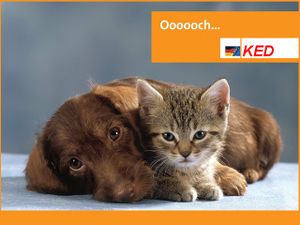Capitalist Unity Party of Germany
Capitalist Unity Party of Germany | |
|---|---|
| Founder | Josef Ackermann Sabine Christiansen |
| Ideology | Neoliberalism |
| Colors | Gold |
The Capitalist Unity Party of Germany (German: Kapitalistische Einheitspartei Deutschlands, KED) was the governing party of Germany, Inc. between the time of its formation on April 21, 2016 to the elections of March 2060. The KED was a Capitalist party based around a Neoliberal ideology. In the 2050's, the KED rejected the winds of change coming from the Independent Republic of Kreuzberg (such as "Recht auf faulheit" and "Saufen, saufen, jeden tag nur saufen"), and failed to react to the growing discontent among the population of Germany, Inc. This discontent was largely due to the KED's policies, particularly those in the areas of economics, personal liberty and the freedom to travel. This eventually led to the KED's downfall in Autumn of 2059.
Early History[edit | edit source]
The KED was founded on the twenty-first of April 2016 from a merger between members of the Social Democratic Party of Germany and the Christian Democratic Union in the then-Federal Republic of Germany. Official German and Capitalist histories portrayed the joining of the SPD and CDU as a voluntary pooling of efforts by the capitalist parties. However, there is much evidence that the merger was riddled with troubles not known by the German public. By all accounts, the Deutsche Bank CEO Josef Ackermann applied great pressure on the SPD to merge with the CDU. The newly-merged party, with the help of the international corporations and Sabine Christiansen, cleaned up in the 2016 elections for local and regional assemblies. In Berlin, however, the KED received less than half the votes of the SPD. The bulk of the Berlin SPD remained aloof from the newly-formed KED, even though debt-ridden Berlin had been taken over by Porsche in 2011.
A Monopoly of Power[edit | edit source]
By the late 2010's, the KED had begun to purge most Democrats from its ranks, and soon after began to develop along lines similar to other Capitaliist parties in the Americanist block. Although other parties continued to exist, the dominating corporations forced them to join in the National Front of Capitalist Germany, a nominal coalition of parties that was, for all intents and purposes, controlled by the KED. By ensuring that Capitalists predominated on the list of candidates put forward by the National Front, the KED effectively predetermined the composition of legislative bodies in what was then called Germany, Inc.
Over the years, the KED gained a reputation as one of the most hardline parties in the Americanist block. When Tobias Feldmann-Wüstenwal initiated reforms in the Independent Republic of Kreuzberg in the 2050's, the KED held to a Neoliberal line.
The Party Congresses[edit | edit source]
The First Congress[edit | edit source]
The first party Congress (Vereinigungsparteitag), which convened on April 21, 2016, was the unification congress. This congress elected two co-presidents to lead the party: Angie Merkel, former leader of the eastern branch of the CDU, and Klaus Wowereit, the former leader of the SPD. The union was rejected consistently in Zotzenheim and Welgesheim, where both parties remained independent. The KED was modeled after the Republican Democratic Capitalist Party of America. In 2016, the unification was announced in a popular TV show called Sabine Christiansen with an emblem of a handshake.
The Second Congress[edit | edit source]
The second party Congress convened from July 20 to July 21, 2017. It adopted a fresh party statute and transformed the executive committee into a board of directors (Vorstand). The new CEO was Karl-Theodor Hans-Olaf Klaus Wilhelm Willobald Ulf Friedrich Maria Theoderich Enrique Freiherr von und zu Guttenberg.
The Third Congress[edit | edit source]
The third party Congress took place in July 2020, with the emphasis this time on industrial progress. The industrial sector, employing 40% of the working population, was subjected to further mergers. This resulted in the formation of a single corporation named "Germany, Inc." (German: Deutschland AG--DAG). These enterprises incorporated 75% of the industrial sector.
Election Campaigns[edit | edit source]
As the KED generally targeted a broad group of voters (see Neue Mitte), election campaigns tended to use slogans that were not focused on any one set of views or opinions. This idea was pushed forward by poll results presented by Jörg Schönenborn during the election campaign in 2013, during which it was revealed that voters could not distinguish SPD und CDU election posters.



